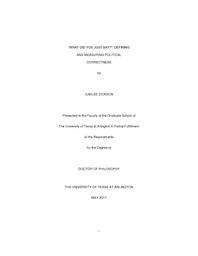
ATTENTION: The works hosted here are being migrated to a new repository that will consolidate resources, improve discoverability, and better show UTA's research impact on the global community. We will update authors as the migration progresses. Please see MavMatrix for more information.
Show simple item record
| dc.contributor.advisor | Kenworthy, Jared B. | |
| dc.creator | Dickson, Jubilee | |
| dc.date.accessioned | 2017-07-03T15:36:44Z | |
| dc.date.available | 2017-07-03T15:36:44Z | |
| dc.date.created | 2017-05 | |
| dc.date.issued | 2017-05-12 | |
| dc.date.submitted | May 2017 | |
| dc.identifier.uri | http://hdl.handle.net/10106/26821 | |
| dc.description.abstract | Political correctness (PC) is a common topic in pop culture and online posts, recently gaining fresh attention in the media and in politics. Meanwhile, researchers have been discussing the meaning of this term, as well as the implications for research, for nearly three decades. However, up until now, there has been no method of measuring political correctness as a construct, nor even an agreed upon definition or understanding of PC. This paper describes PC as another “ism”, that is, PCism, and like other isms, PCism includes cognitive, affective, and behavioral components. The current study presents a new measure to assess the attitude components of political correctness indirectly through a language preferences assessment. Validity and reliability of this new measure were evaluated and established across two different studies. Results suggest that the new PC measure is related to previously validated personality and attitude measures including Social Dominance Orientation, Right-Wing Authoritarianism, Universal Orientation, and the Big Five factors of openness and agreeableness. However, the PC scale does not completely overlap with these existing measures, suggesting that it is capturing something unique. Future analysis is suggested in order to further validate the PC measure and also to probe the relationships with other measures to explain how language choices are related to attitude and personality factors. | |
| dc.format.mimetype | application/pdf | |
| dc.language.iso | en_US | |
| dc.subject | Political correctness | |
| dc.subject | Inclusive language | |
| dc.subject | Bias | |
| dc.subject | Social dominance | |
| dc.subject | Right-wing authoritarianism | |
| dc.subject | Personality | |
| dc.subject | Attitudes | |
| dc.title | “What Did You Just Say?”: Defining and Measuring Political Correctness | |
| dc.type | Thesis | |
| dc.degree.department | Psychology | |
| dc.degree.name | Doctor of Philosophy in Psychology | |
| dc.date.updated | 2017-07-03T15:37:47Z | |
| thesis.degree.department | Psychology | |
| thesis.degree.grantor | The University of Texas at Arlington | |
| thesis.degree.level | Doctoral | |
| thesis.degree.name | Doctor of Philosophy in Psychology | |
| dc.type.material | text | |
| dc.creator.orcid | 0000-0002-8399-0235 | |
Files in this item
- Name:
- DICKSON-DISSERTATION-2017.pdf
- Size:
- 1.143Mb
- Format:
- PDF
This item appears in the following Collection(s)
Show simple item record


